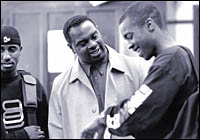Transforming Boyz II Men

Presiding over the classroom, Kevin Fuller, Ed.M. 00, looks like a missionary a free-spirited, high-stye preacher, dressed in a long, raspberry, collarless jacket, pressed black dress shirt and pants, and polished black shoes. High noons sun nudges the window shades at Brighton High School as Fuller rises from behind the teachers desk, where he leads a support group for African-American males. Leaning over a table where a handful of seniors sit, he laughs at the discomfort and confusion of his own childhood. He describes his 11th birthday party, when his uncles teased him about which of the little girls at his party was his girlfriend.
“I was 11!” he says, disbelief rippling his voice. Because he didnt have a girlfriend, he says, “I felt like something must be wrong with me.” After that, Fuller says, he started talking to as many girls as possible so he would be prepared to answer his uncles question the next time.
Conversation takes off. Twenty-three boys puzzling through why they treat girls the way they sometimes do and, with Fullers guidance, beginning to look at what it says about them when they act disrespectfully toward another human being. No easy answers plucked from the air. Just an open exchange, where normally there is silence and confusion.
“I often try to bring myself into the discussion,” Fuller says a week after the last meeting of the class. “I learned this from [Assistant Professor of Education] Mike Nakkulas class: you bring in your own experience because it makes you human and gives the class the chance to be your counselor, so you both grow from the experience.” For example, Fuller explains, his class ” . . . could talk about sexuality and reflect on their experiences because they said okay that happened to you too.”
Fuller discovered this position at Brighton High through the Office for School Partnerships, which helps translate important new research into real-life practice by matching Graduate School of Education (GSE) students and faculty with Cambridge and Boston schools. Fullers group started with 19 males and grew to 23 after some of the boys asked if they could bring their friends. Thats 23 boys who Fuller met with each week, both as a class, and individually during lunch breaks, after school, and even on the weekends while completing his own degree. “It was important to meet them when they could, because I had no prior experience with them; I wanted to show them how invested I was.”
What he didnt expect was how attached he would get to the class. “They were so appreciative. You would not believe how special they made me feel. They would bring me juice because they didnt know if I had time to eat. They were thinking of someone else, which is something guys dont often do.”
Fuller, 33, says that not all the problems among African-American males begin with single-mother households. In fact, he suggests that even two parents may not be enough to instill values in children that will advance their lives. “The more positive relationships kids have outside of home, the more possible it is that they will reach the goals parents are hoping for.” His voice is matter-of-fact when he says “The youth culture I work with does not think that doing well in school has anything to do with a good life.”
Along with a good education, Fuller emphasizes with adolescents the importance of respecting authority and showing respect for yourself. “I know their parents are telling them pull your pants up and dont wear a do-rag. But they never process why this is important. Im trying to give them the information to understand the messages theyre sending. As long as they know theyre making choices, thats fine.”
His work at Brighton High is an extension of the Bridge Builders, an organization Fuller founded in his hometown of Portland, Ore., years before enrolling in the masters program at the GSE. The Bridge Builders was created to help African-American males make the transition into manhood. The organization, for which Fuller hopes to develop a satellite program in Boston later this year, strives to strengthen the African-American community by promoting spirituality, scholarship, entrepreneurship, and community-building through an African-centered rites-of-passage program. Rites-of-passage activities include links with adult mentors, college admissions counseling, big brother activities, and group visits to houses of worship.
“There is a lost sense of hope for so many young people,” Fuller says in a soft drawl, a contrast to the big, ebullient personality he brought to his class. “Even their willingness to dream has disappeared. Dreams cant come true until you wake up to who you really are and what you want to become,” Fuller says. “This is what the rites of passage is aboutthis movement from point A to point B.”
Brian Coakley, an honors biochemistry student who just completed his sophomore year at Harvard, met Fuller four years ago in Gresham, Ore. when he joined the Bridge Builders. “Going through the rites of passage was probably the most mentally, emotionally, and physically challenging time Ive been through. But its given me 10 really close friends that I can count on to help me out anytime I need to.” Coakley and Fuller remained in close contact this past year.
“You struggle because not everybody has had the same opportunity to reflect and become self-authoring,” Fuller says. He talks about his own development as a man this way: “Im going to write this story for me and mine. Im not going to go with the status quo. Its a lifelong process.” He says having people around who share your vision makes the journey a little easier.
What about Fullers uncles? “They havent changed at all. They ask Have you met any girls at Harvard? I tell them Yes, I met lots of girls.”




